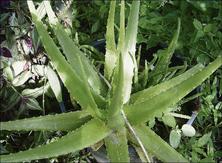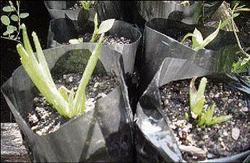

Left: Hardened aloe, ready for the field.
Right: Aloe in tissue culture.
Sylvia Mitchell and Rani Jagnarine, Medicinal Plant Research Group, Biotechnology Centre, UWI
'Four vegetables are indispensable for the well-being of man: wheat, the grape, the olive and the aloe. The first nourishes him, the second raises his spirit, the third brings him harmony and the fourth cures him.'
- Christopher Columbus
Aloe vera is a plant that is native to East and South Africa, but is cultivated in the West Indies and in the southern United States. The plant is unable to withstand cold conditions which make the Caribbean ideal planting ground for this world-recognised plant. The aloe family belongs to the 'Xeroids' which are desert plants. Almost all Xeroids have a special chemical make-up to close any wound almost immediately, so the plant will not lose its precious water. The wound heals quickly, and so will ours if aloe sap is placed on it. Aloe vera leaves are thick and fleshy with a gel-like substance which contains many of aloe's medicinal properties. The aloe plant is made up of 96 per cent water. The remaining four per cent contains active ingredients such as essential oils, amino acids, minerals, vitamins, enzymes, triperpenes, glycoproteins, glycosides and polysaccharides.
Great skin treatment
Aloe is used externally to treat a number of skin irritations. Its gel has antiseptic and antibiotic properties which make it highly valuable in treating cuts and abrasions. It has been commonly used to treat burns, eczema, fungal infections and other skin conditions as well as being a skin moisturiser, skin cleanser, scar remover and hair conditioner. Slice the aloe leaf and rub the inner mucilage on the cuts. For swellings, place a leaf in warm water then apply, and for burns, drain the fluid directly on to the site.
Internally, aloe is used as a purgative for gas, for colonic cleansing, to soothe peptic ulcers, irritable bowel syndrome, hypertension, colds and nerve conditions.
It has strong immunomodulatory and antitumor properties, eases inflammation and enhances the antioxidant effect of vitamins. In recent studies, it has been shown that aloe ma DNA in a manner that is helpful for people with cancer. This list is not exhaustive as only a precursory glance on the Internet will show you. For gastrointestinal disorders, place the peeled leaf in water for four-five hours and then drink, or boil and drink to treat diabetes and lower cholesterol levels. As an anti-inflammatory agent or blood cleanser, blend and drink one cup for a week. Do not drink aloe for more than two weeks at a time as it depletes the body of potassium.
Aloe's main user today is the cosmetic industry becuase of its healing, soothing, antibacterial and moisturising qualities. Studies have proven the use of aloe gel to enhance or accelerate cell growth in the skin. It's also found in sunscreen, after-sun lotions creams, lotions, and facial washes. Aloe can also be found in food products such as jams, jellies, yoghurt and ice cream.
Two components of the aloe can be used - the clear inner gel and the bitter yellow gel just under the skin. The aloe gel, when exposed to oxygen for four hours, oxidises and becomes worthless. So the whole process from harvesting to manufacturing has to be less than four hours to stabilise the gel. There are four basic methods of processing aloe leaves: traditional hand fillet method, whole leaf aloe, aloe powder and total process aloe.
Jamaica has the ideal climate to commercially cultivate aloe vera. The market is rapidly expanding as scientific research is being turned into many useful and effective products. Through the use of Plant Tissue Culture, Jamaica might be able to successfully tap into this lucrative market, boosting our economy with an influx of foreign currency. To harness the potential of aloe, we are developing micropropagation protocols and testing the plantlets produced to determine their yield and bioactives. After that, we aim to go into production, to fully utilise aloe's potential, for health and wealth.
The MIAS is a non-profit organisation of the University of the West Indies, Pure and Applied Sciences Department, offering analytical, technical and web services and specialised science projects. If you have any question or comments about these articles, please email: mias@uwimona.edu.jm or contact the MIAS Analytical Services Division at 970-2042 or 512-3067 for enquires on services offered.

